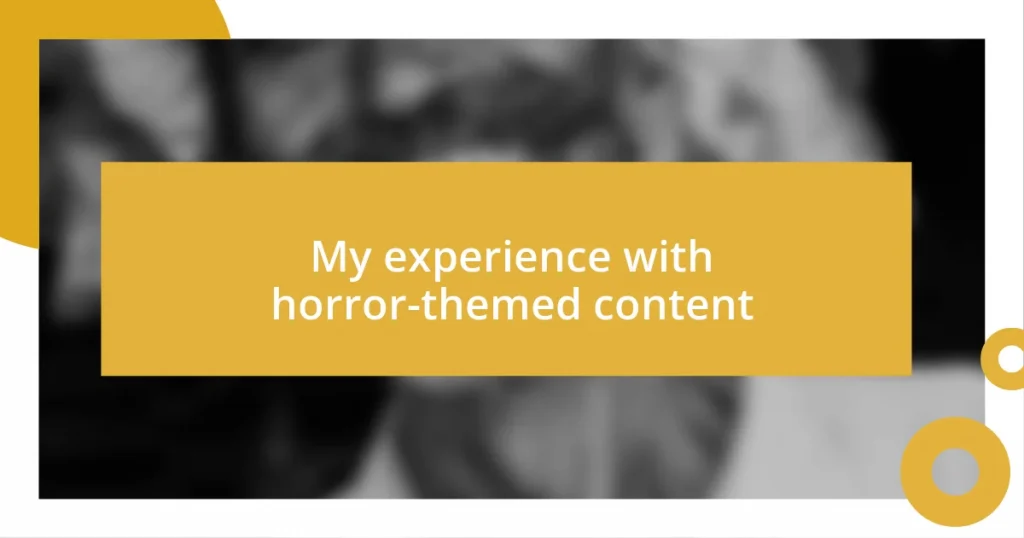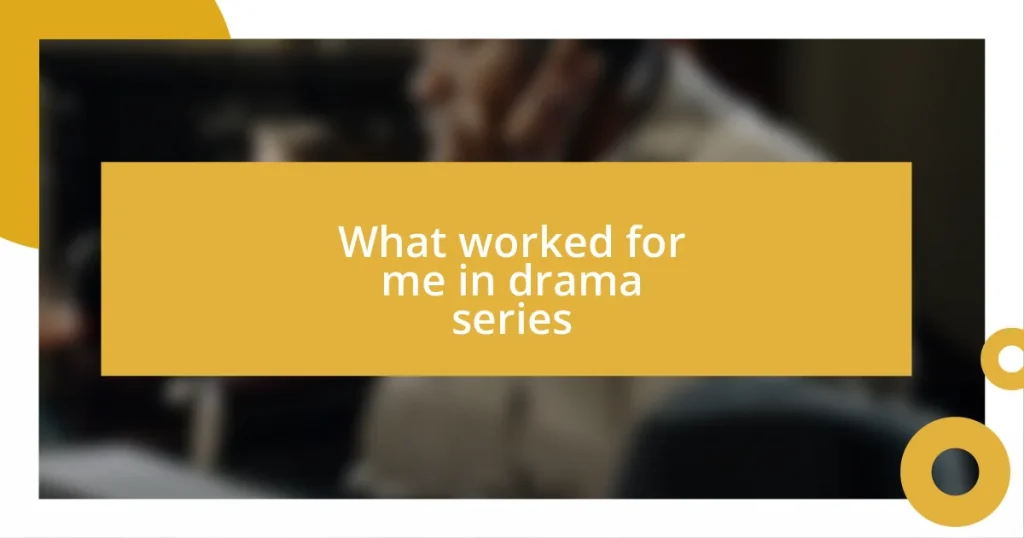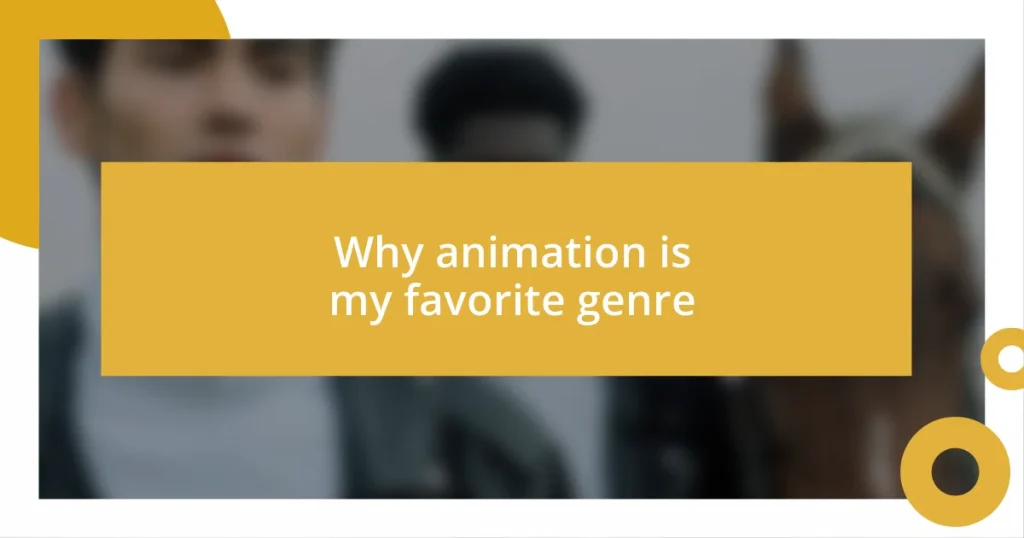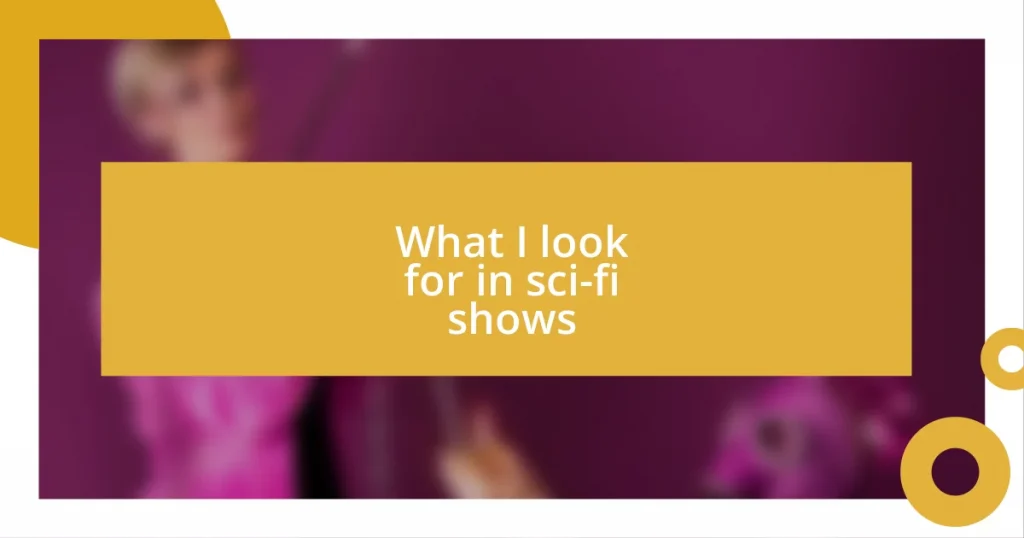Key takeaways:
- The author’s fascination with horror began unexpectedly after watching “The Shining” and evolved through engaging with Stephen King’s novels, revealing how horror intertwines fear with relatable emotions.
- Horror serves as a medium for exploring personal and societal fears, offering catharsis and a safe space for reflection, as demonstrated in experiences shared during horror movie night and literature discussions.
- Participating in horror communities enhances connections with others, fosters creativity, and provides insights into personal fears, moral dilemmas, and storytelling, highlighting the genre’s complex, unifying nature.
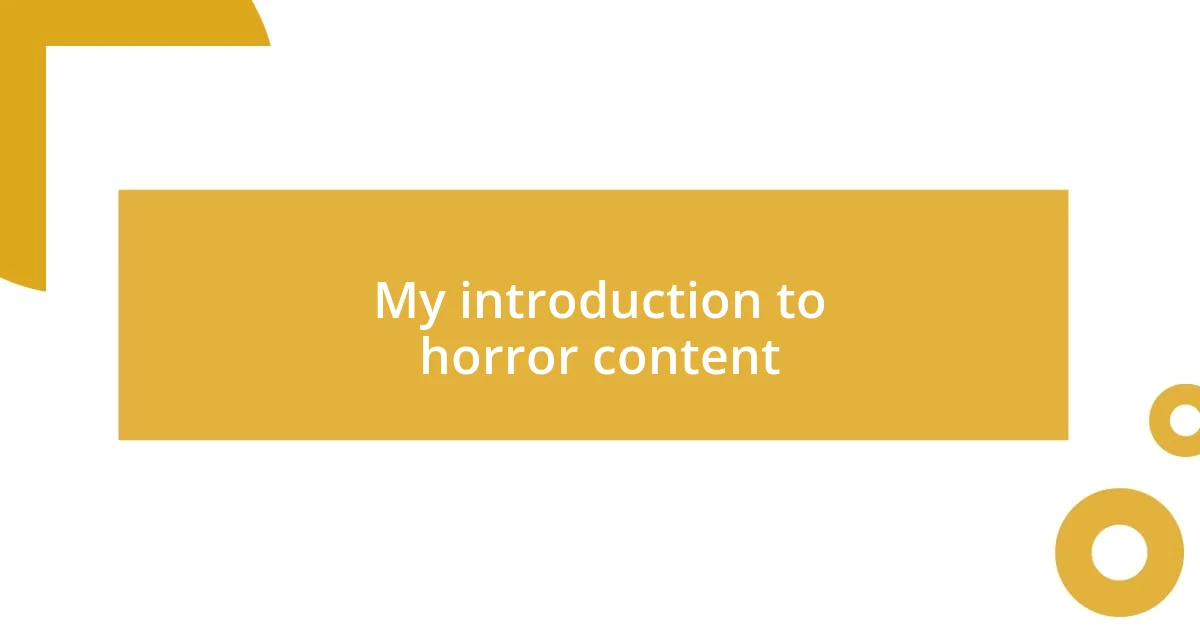
My introduction to horror content
My introduction to horror content was quite unintentional but profoundly impactful. I remember sneaking a peek at the classic film “The Shining” late one night, feeling a mix of excitement and terror as I watched shadows dance across the screen. Did I really want to watch something that might keep me up all night? That thrill of fear tugged at me, igniting a fascination I didn’t know I had.
As I ventured further into the genre, I stumbled upon Stephen King’s novels, which completely entranced me. I still recall the anxious feeling as I turned each page of “It,” getting lost in the eerie world of Derry, Maine. The characters felt relatable, and I found myself questioning—could something so fantastical exist? This blend of reality and imagination drew me deeper into horror, revealing how it taps into our deepest fears and curiosities.
There was one particular night when I decided to binge-watch a series of horror films with friends. As shadows crept in from the corners of the room and each jump scare sent my heart racing, I realized that horror is more than just tales of fright; it’s also about shared experiences and bonding through fear. In those moments, I laughed, screamed, and felt alive—wondering if the real horror lies not only in the stories but also in confronting what terrifies us the most.
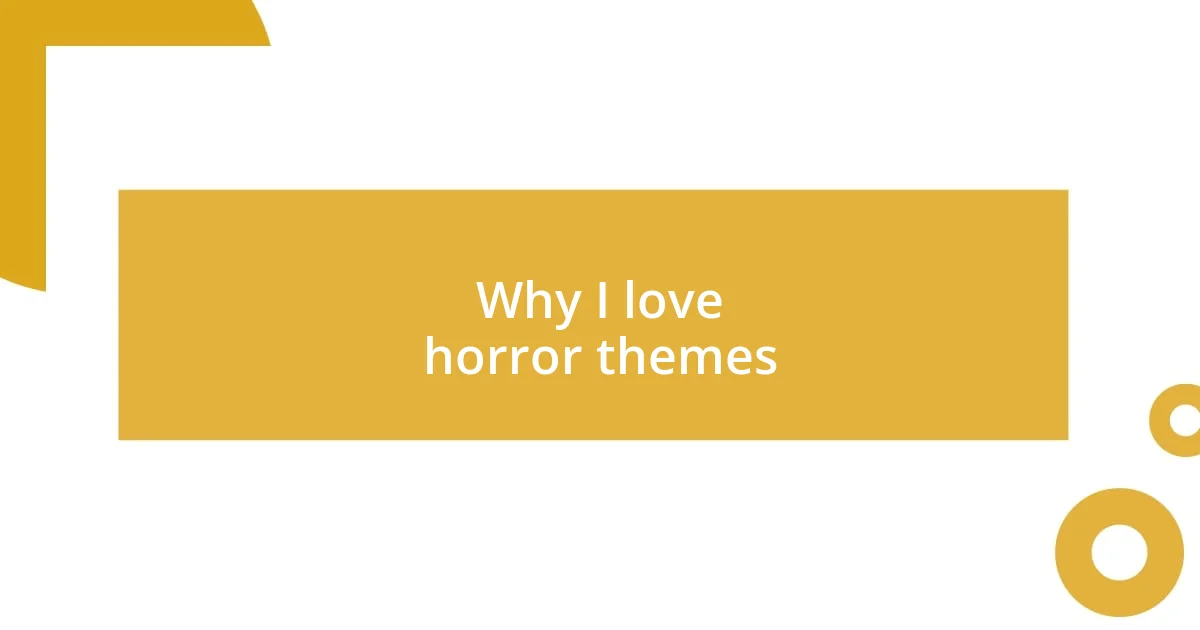
Why I love horror themes
I’ve always found horror themes to be fascinating because they allow me to explore emotions I wouldn’t typically confront in my everyday life. One vivid memory comes to mind. During a chilly Halloween night, while curled up in a blanket with a group of friends, we watched “Hereditary.” The atmosphere was electric—each unsettling moment fueled our laughter, screams, and discussions about the deeper meanings behind the horror. It created a bond between us, as we shared this wonderfully terrifying experience that is both overwhelming and unifying.
What captivates me about the horror genre is its ability to reflect societal fears while also providing a safe space to confront them. I recall reading a horror short story that eerily mirrored issues in my own life—a sense of isolation and fear of the unknown. It was a weird awakening; it made me realize that horror is a form of catharsis, allowing viewers and readers, like me, to process feelings in an artistic way. Instead of running away from fear, I embraced it. It offered me a chance to examine my own vulnerabilities through a thrilling lens.
The unexpected twists and boundary-pushing narratives in horror films and books often spark a thrill of curiosity in me. Recently, I watched “The Babadook” for the first time, and it struck a chord with me. The story, while terrifying, explores grief and motherhood, encouraging viewers to confront the much deeper issues that lie beneath the surface. It prompted me to think: isn’t it incredible how horror can be both entertaining and thought-provoking? I’m continuously drawn to how the genre can transform my understanding of fear and evoke powerful emotions that linger long after the credits roll.
| Aspect | My Experience |
|---|---|
| Emotional Connection | Horror creates shared experiences that deepen bonds. |
| Reflecting Fears | Horror offers safe exploration of societal and personal anxieties. |
| Engagement | Thought-provoking narratives inspire curiosity and self-reflection. |
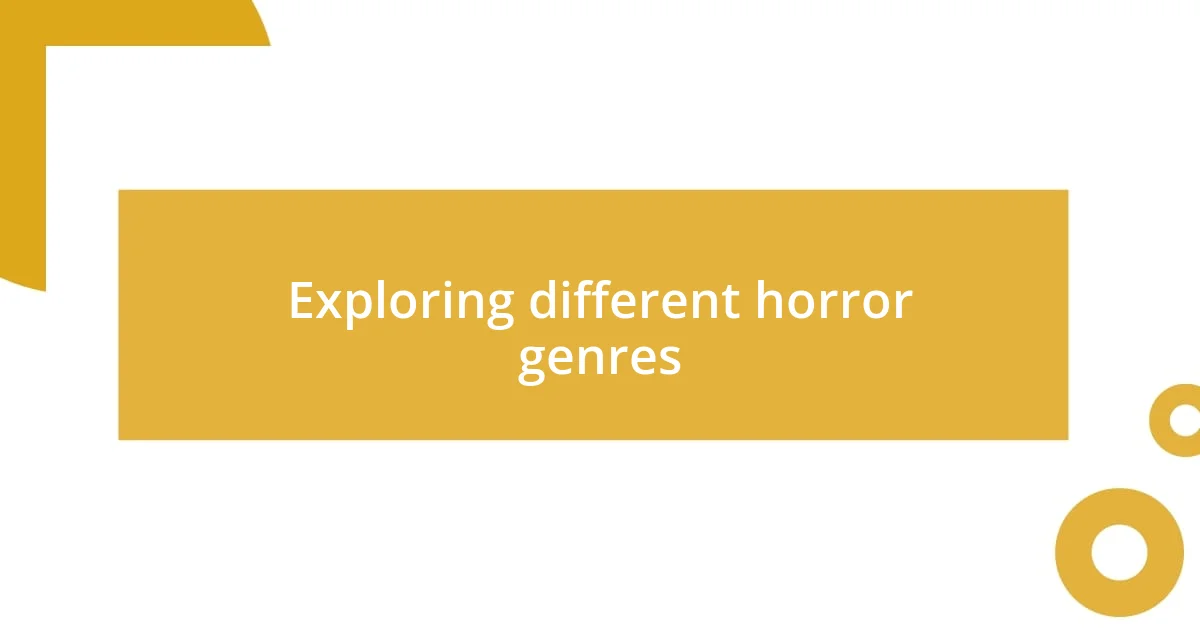
Exploring different horror genres
There’s an expansive array of horror genres out there, each offering a unique flavor of fear. From psychological thrillers that prey on our minds to slasher films that reveal the horrors of violence, each genre taps into different fears and emotions. I can vividly recall marathoning classic horror movies with friends during a storm—a collection of gothic tales and ghost stories. The atmosphere became charged with every creaky floorboard and clap of thunder, immersing us in an experience that transcended just watching a movie.
Here’s an overview of some popular horror genres I’ve encountered along my journey:
-
Psychological Horror: Focuses on the mental and emotional states of characters. Think of films like “The Silence of the Lambs” that linger in your mind long after viewing.
-
Supernatural Horror: Features elements like ghosts, demons, or otherworldly forces, such as in “Poltergeist,” leaving you questioning reality.
-
Slasher Films: Characterized by a killer stalking and murdering a group of people, epitomized by classics like “Halloween”—pure adrenaline!
-
Body Horror: Explores the grotesque potentials of the human body, with films like “The Fly” showcasing the terrifying transformation of flesh.
-
Found Footage: This genre simulates actual footage, immersing viewers in an intimate yet unstable space, as seen in “Paranormal Activity.”
Diving into these genres helped me understand my own fears better. Each style provoked a distinct emotional response, whether it was the anxiety from the unknown in supernatural tales or the visceral reactions evoked by slashers. It feels like a personal invitation to confront our deepest fears—something I’ve found endlessly fascinating.
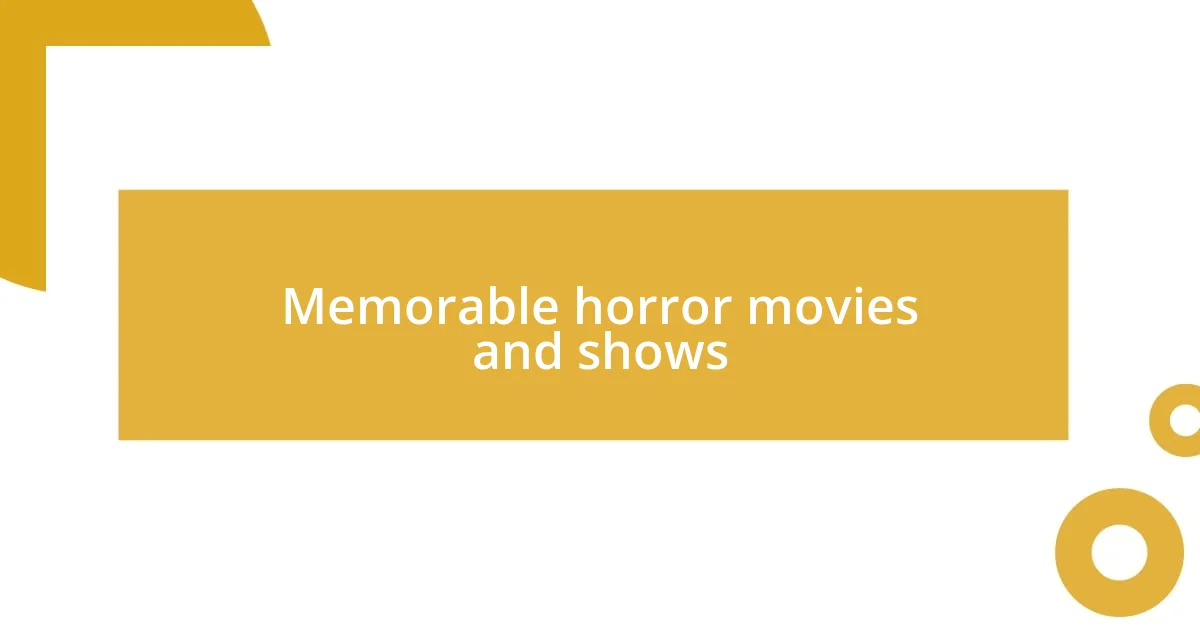
Memorable horror movies and shows
I remember watching “The Shining” late at night with the lights dimmed low, every flicker of the screen amplifying the suspense. Jack Nicholson’s performance was so intense that it left me on the edge of my seat, questioning my own well-being. How can a film so chilling become a timeless classic? It’s the intricate layering of dread and madness that makes it unforgettable. Each viewing reveals something new about isolation and the fragile grip on sanity that resonates with a part of me.
Another standout moment in my horror journey was experiencing the underground sensation of “It Follows.” The unique concept of an unstoppable force was both terrifying and, in some strange way, relatable—especially in how it reflects the fears of adulthood and responsibility. I still recall the first scene when the tension was palpable, my heart racing alongside the characters. In a way, I felt as if I were being pursued too, catching a glimpse of how fear can linger in our minds, just waiting for that unsettling moment to return.
Then there’s “American Horror Story,” which has become a sort of cultural phenomenon in my own life. I binge-watched the first season alongside a group of friends, and our varied reactions created a lively debate—was it the horror or the social commentary that made it riveting? This show revealed how horror could be an exploration of identity and society’s struggles, compelling me to think deeper about the stories we tell. Isn’t it fascinating how horror can act as a mirror, reflecting our nuances while keeping us entertained?
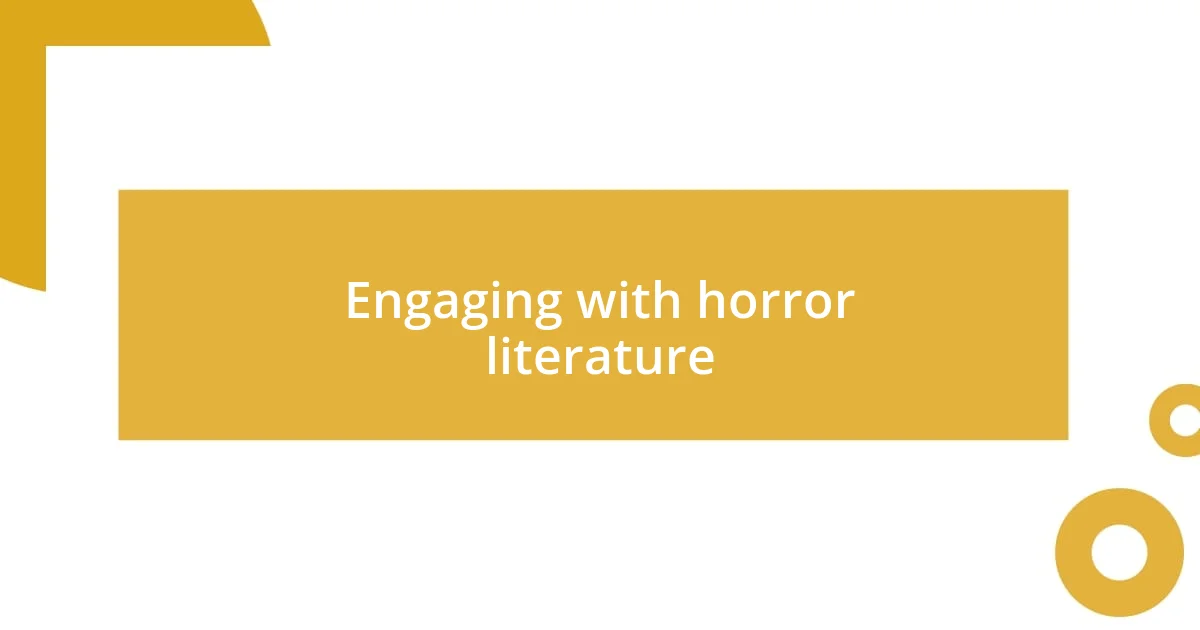
Engaging with horror literature
Engaging with horror literature offers a distinct avenue for contemplation and connection to our own emotions. I remember picking up Shirley Jackson’s “The Haunting of Hill House” one chilly evening, and I was captivated by its psychological depth. The way she intertwines the supernatural with the characters’ inner turmoil is brilliant; it pushed me to reflect on how fear often stems from our minds more than the external world. Doesn’t it strike you as fascinating how exploring a haunted house can lead you to confront your own ghosts?
As I delved deeper into horror novels, I found that not all scares come from blood and gore; sometimes, it’s the subtle nuances that linger. I recall finishing “Bird Box” by Josh Malerman and feeling a weight in my chest. The sheer terror of the unseen—a force that drives people to madness just by looking at it—haunted me for days. It raised the question: what are we afraid of seeing in our own lives? The power of horror literature lies in its ability to connect these visceral reactions to real-world fears, making every page a reflection of our hidden anxieties.
Engaging with horror isn’t merely about the thrill; it’s about the conversations it sparks among readers. I attended a book club discussion on “The Cabin at the End of the World” by Paul Tremblay, and the range of perspectives amazed me. Each of us carried our interpretations of the tension and the moral quandaries presented. Isn’t it remarkable how horror serves as a catalyst for deeper discussions? It’s like we are demystifying our fears together, allowing the genre to foster a sense of community through shared experiences and insights.
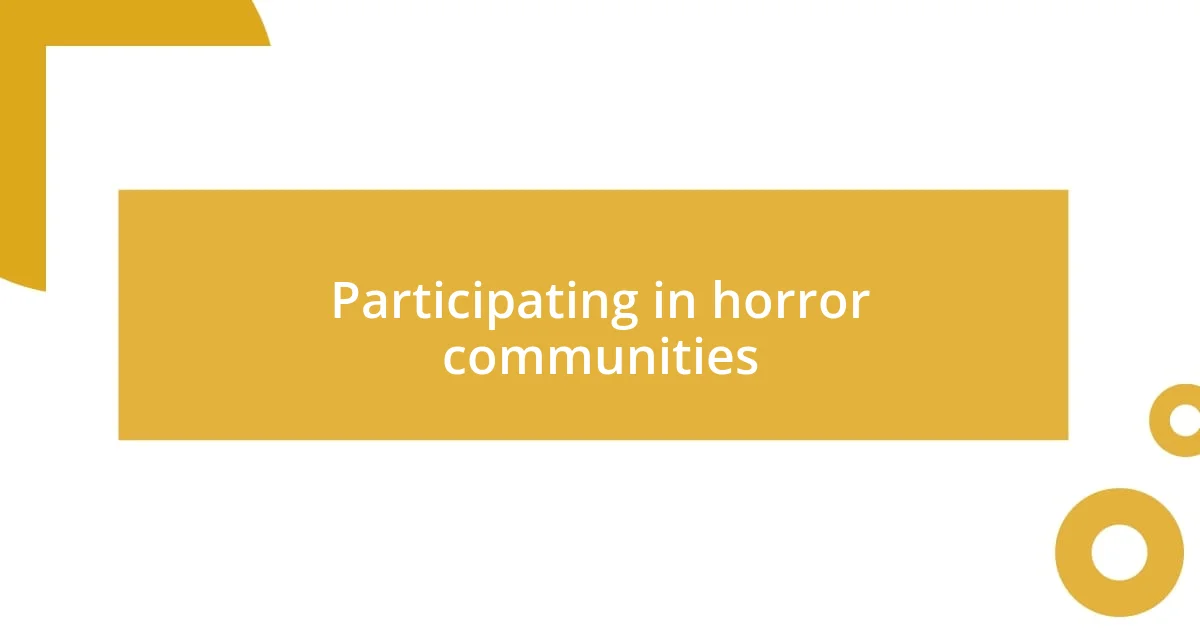
Participating in horror communities
Joining horror communities has been like stepping into a realm where fear becomes a shared language. I recall my first online horror forum experience; I felt a rush of excitement when I posted about a nightmare I had after binge-watching “Hereditary.” The responses were overwhelming: others shared their own eerie stories, creating an unexpected bond over our collective fear. Have you ever felt that sense of camaraderie when discussing a chilling experience with someone? It’s in these moments that I realized how horror unites us, transcending mere entertainment.
In another instance, I participated in a local horror convention, and the atmosphere was electric. I chatted with fellow enthusiasts about everything from classic monster movies to indie horror shorts, each conversation dripping with passion. There’s something invigorating about being surrounded by people who not only understand but revel in the genre’s quirks. Don’t you agree that these gatherings can feel like coming home? It’s a space where we can embrace our freaky interests and celebrate the diversity of horror storytelling.
I’ve also dabbled in creating horror-themed content myself, from writing short stories to crafting eerie visuals for social media. I remember posting a creepypasta I’d written, and the feedback was intoxicating—some readers were genuinely spooked! Seeing how my work could elicit such visceral reactions was a thrill. Isn’t it fascinating how participating in horror communities can transform us from mere spectators into storytellers, all while amplifying the genre’s allure? Each interaction deepens my understanding and appreciation for horror, reminding me that there’s a vast, imaginative world waiting just beyond the shadows.
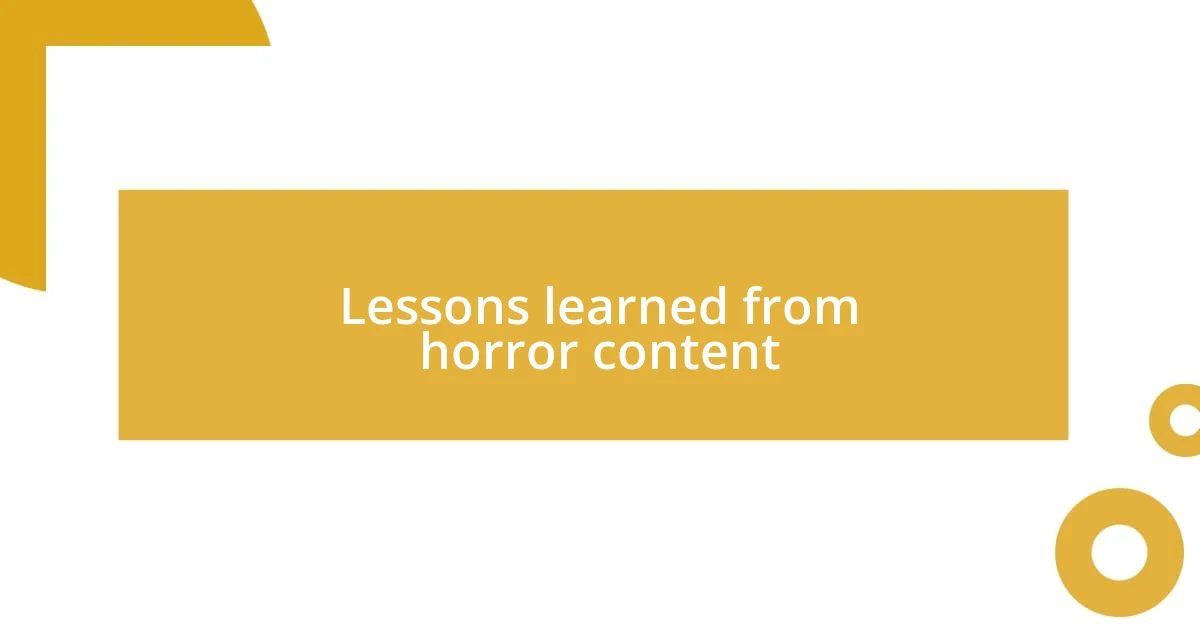
Lessons learned from horror content
When I reflect on the lessons horror content has taught me, one stands out: the importance of facing our fears head-on. I still remember the first time I watched “The Babadook.” The heart-racing tension led me to consider my own grief and how I often shove it aside. Isn’t it a bit enlightening how a monster on screen can nudge us to confront our personal demons? This connection helps me understand that acknowledging fear can be a step toward healing.
Another insight that has resonated with me is how horror poses moral dilemmas that echo real life. Take “Get Out,” for instance. As I watched Chris navigate a surreal but terrifying scenario, I found myself considering the implications of trust and manipulation in relationships. It dawned on me—how often do we overlook red flags in our lives? Horror, in a way, challenges us to examine our choices, helping us navigate the darker aspects of human behavior that we might prefer to avoid.
Lastly, horror has cultivated my appreciation for creativity in storytelling. I’ve experimented with weaving my narratives inspired by the genre; it’s shown me that fear can be a compelling muse. After writing my own short horror story, a friend told me it gave them chills—an absolute rush! Isn’t it remarkable how crafting something from our nightmares can forge connections and resonate with others? The lessons I’ve gleaned from horror are not just about being scared; they encompass emotional resilience, moral reckoning, and the boundless power of imagination.










